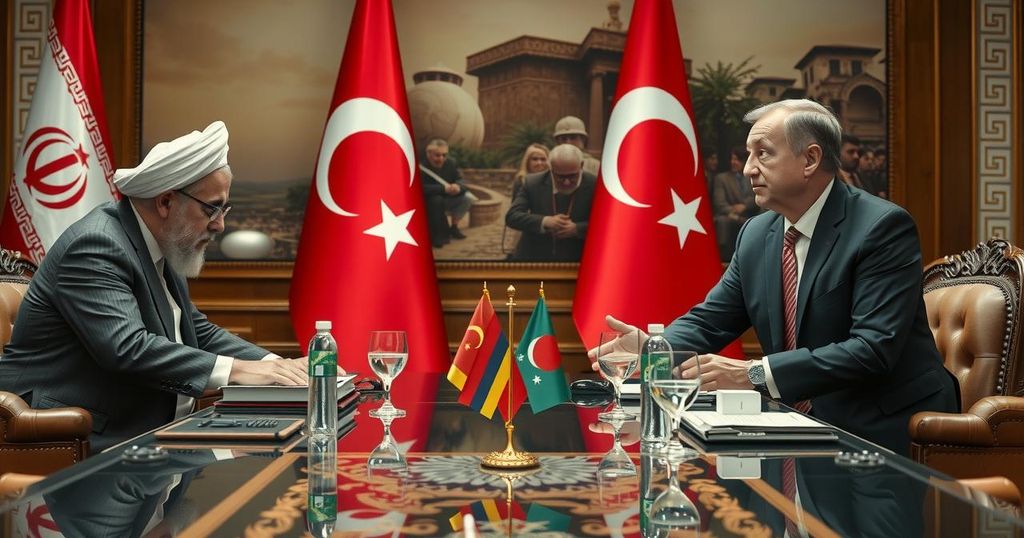Global news
AL, AN, ANIS, ASIA, BASHA, BASHAR, CIVILIAN CASUALTIES, CONFLICT, EGYPTIAN COUNCIL FOR FOREIGN AFFAIRS, ERDOGAN, EUROPE/ASIA, GAZA, GAZA STRIP, HAMAS, HEZBOLLAH, IRAN, MIDDLE, MIDDLE EAST, MIDDLE EAST CONFLICT, NORTH AMERICA, RUSSIA, THENATIONALNEWS, UNITED STATES
Jamal Walker
0 Comments
Turkey and Iran Leaders Convene in Egypt Amid Shifting Middle Eastern Dynamics
Egypt hosted the leaders of Turkey and Iran at the Developing-8 summit, highlighting the growing influence of non-Arab nations in the Middle East amidst regional turmoil. The summit discussed the ongoing conflicts in Gaza and Lebanon, the impact of Iranian proxies, and the need for cooperation on security issues. This event signifies a renewed effort to normalize relations between Egypt and Iran, despite historical tensions and competing interests in regional conflicts.
On Thursday, Egypt hosted the leaders of Turkey and Iran at the Developing-8 summit, a coalition of eight Muslim-majority countries. This event took place in the New Administrative Capital, east of Cairo, against the backdrop of significant instability in the Middle East, particularly relating to the influence of non-Arab nations. The recent weakening of Iranian-supported Hamas and Hezbollah by Israel emphasizes this shift. The summit marks the first meeting between President Recep Tayyip Erdogan of Turkey and Iran’s President Masoud Pezeshkian since the recent ousting of Syrian President Bashar Al Assad, a situation supported by Turkey amidst Iran’s longstanding alliances in the region.
President Pezeshkian’s visit is notable as he is the first Iranian president to visit Egypt since Mahmoud Ahmadinejad in 2013. This political engagement illustrates an attempt to normalize relations that have been historically strained since the Islamic Revolution in 1979. During their discussions, topics such as Iranian-backed attacks in the Red Sea and the ongoing Gaza conflict are expected to be central to the dialogue. Egypt’s President Abdel Fattah El Sisi aims to address the threats posed by Houthi forces on shipping routes, which have severely impacted Egypt’s Suez Canal revenues.
Tensions remain between Egypt and Iran regarding the financing of non-state actors and regional conflicts. Although recent developments show a thaw in relations, concerns about Iranian interference in Arab affairs persist. The D-8 summit also emphasizes pressing issues in Gaza and Lebanon, showcasing a focus on the heightened conflict across the region. The partnership between Turkey and Egypt, despite historical tensions, emphasizes a strategic collaboration on regional security and economic cooperation. Both nations also navigate competing interests in ongoing conflicts in Libya and Sudan, revealing the complexity of diplomatic relations in a shifting geopolitical landscape.
The Developing-8 summit in Egypt reflects a changing dynamic in Middle Eastern politics, revealing the rise of non-Arab nations such as Turkey and Iran in a region traditionally dominated by Arab states. The ongoing conflicts involving Iranian proxies have prompted an examination of their influence in the region. Recent events, including the weakening of Hamas and Hezbollah amid military confrontations with Israel, further highlight the shifting balance of power. The summit serves as a platform for leaders to discuss cooperation, regional stability, and the impact of external conflicts on member nations, emphasizing a collective approach to addressing shared challenges.
In conclusion, the Developing-8 summit held in Egypt signifies a critical moment in Middle Eastern diplomacy, particularly regarding the roles of Turkey and Iran. As these non-Arab nations enhance their influence in a volatile region, Egypt’s proactive approach aims to stabilize relationships and address pressing security threats. The outcomes of this summit may set a new trajectory for cooperation among the D-8 member states, while navigating the complexities of geopolitical interests in the Middle East.
Original Source: www.thenationalnews.com




Post Comment